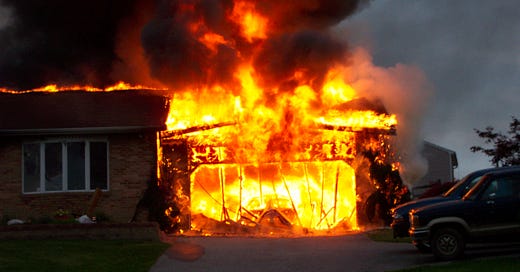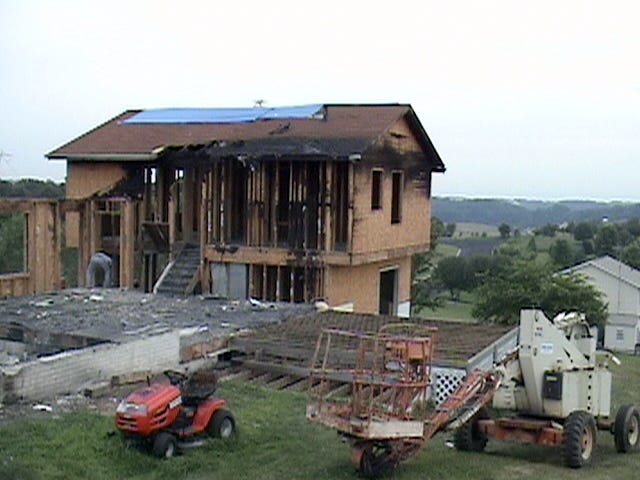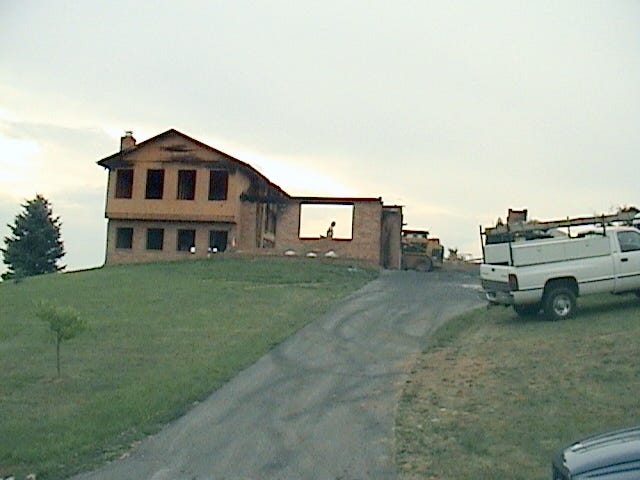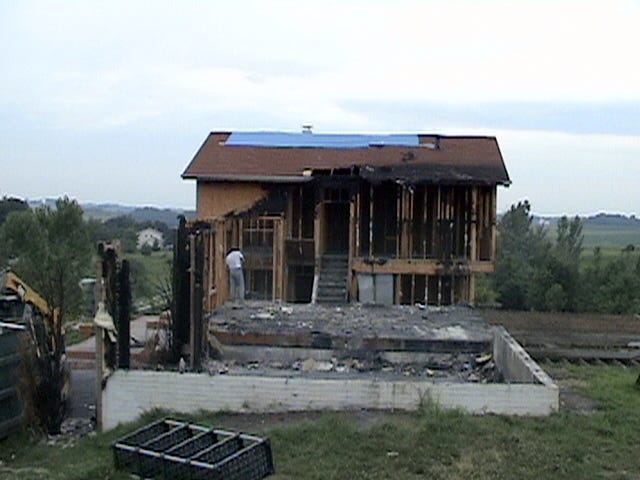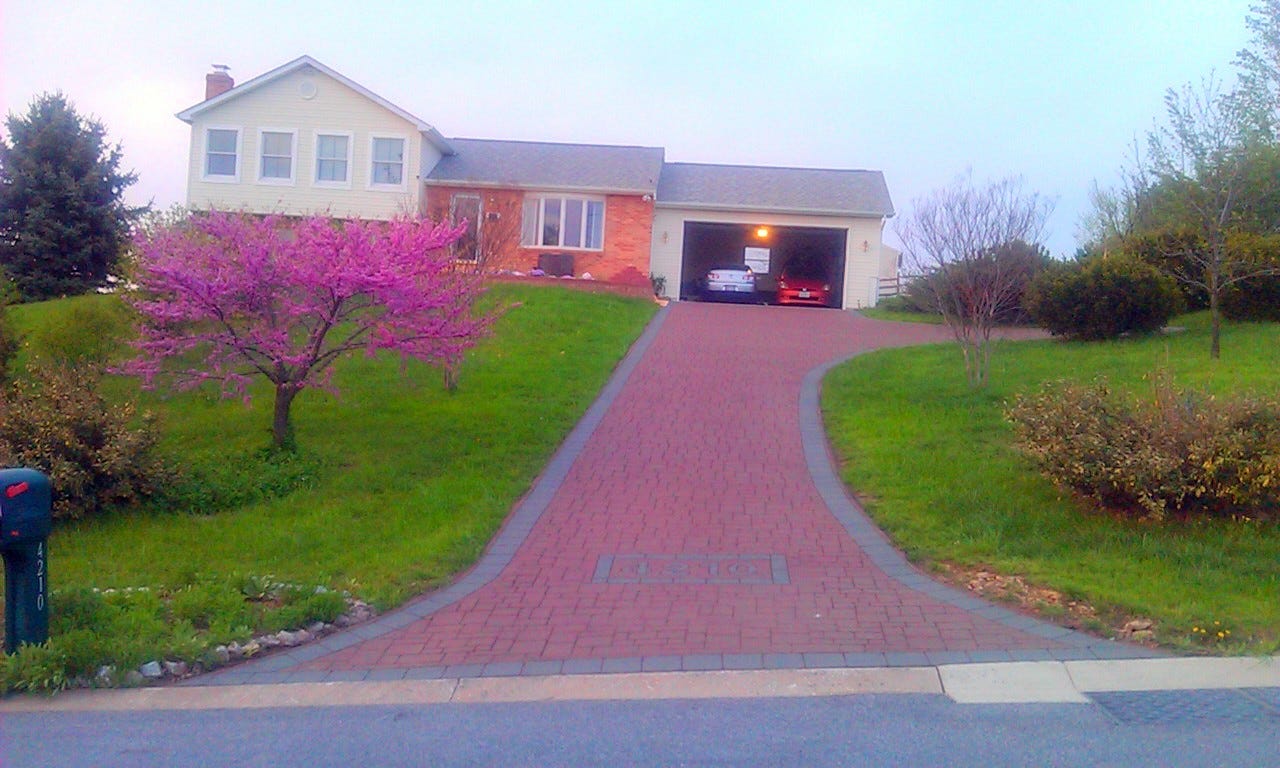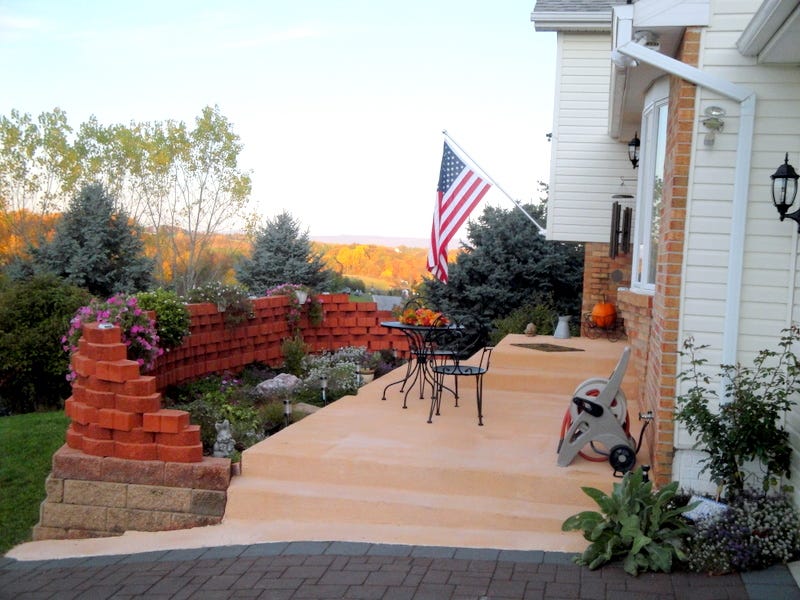There are 3 main phases of flood disaster recovery when your home has been inundated with water, sand, mud, and debris. They are:
Demolition
Dehumidification
Rebuild
Each phase has its own anomalies, issues, and required tasks.
As my house burned down in 2003, I have had experience with the disaster demolition, dehumidification, and the rebuild process. Due to the fire trucks flooding my house and rain falling into the basement for several months, I have some experience with indirect flooding. I will pass along some tips I learned then in hopes it helps those so severely impacted by hurricane Helene in Appalachia.
The cause of the fire was a defective Black & Decker electric lawn mower that was plugged into an outlet in the garage that caught fire. A Product Safety Commission Report verified 13 other houses that caught fire due to the same lawn mover. The company had moved its manufacturing to Red China where the quality control is substandard. So when the circuit board caught fire at night, it engulfed our garage quickly and then the entire house.
When my wife screamed at 6 a.m. that morning, it was so shrill and fierce it shook me out of my deep sleep. I ran downstairs thinking she was being assaulted by an intruder, but the horrible plastic smoke made it hard to see. When I got to her she screamed, “GET EAMON!!!” and pointed at the garage.
I saw Eamon in a closet out of the corner of my eye when I ran downstairs. I looked at the garage as she continued to scream “GET EAMON!!!” and realized that was impossible as there was a huge fire ball in the garage destroying it. I tried to move her but she stayed put with that strength women have when it comes to their children’s safety.
Instead, I ran upstairs, grabbed Eamon and brought him to her. I had to force her head down out of the smoke to see his feet. She had an adrenalin dump and allowed me to move her and push her out the front door. Then I ran upstairs to get Josh was a young teen ager and sound asleep. I screamed at him that the house was on fire and he needed to leave fast. He did not wake up.
So, I punched him in the chest. “What the hell are you doing? he yelled. “The house is on fire and you need to leave!!! I yelled back. He jumped up and we both ran out.
That day was one of the worst of my life…but it was also one of the best. My family was alive and I was alive. And that is what I can share with those in Appalachia so horridly impacted by hurricane Helene.
A woman from up the street dropped by the day of the fire and told me, “Our house caught fire and burned down 3 years ago. I can tell you it gets better. I know it is hard to believe right now, but it gets better.”
So, to those who have suffered from hurricane Helene, I offer the same advice. “I can tell you it gets better. I know it is hard to believe right now, but it gets better.”
Demolition
After a flood, fire, or other natural or manmade event, local authorities (emergency operations personnel, fire fighters, police and others) have the legal authority to condemn your house.
In the case of a flood, a rule of thumb is that everything that has been damaged, or wet, will be torn apart. For safety reasons, immediately after the event they often spray paint an ‘X” to indicate the structure is to be demolished. Oftentimes, this will be followed up a legal form, color coded, to indicate your structure is salvageable or must be demolished.
This is difficult for anyone to accept. You have lived in that house and it is your home filled with loving and good family memories. But nature or man has made the determination that it is no longer safe to live there. Impossible as that is to accept, you must to be able to accept that fact to move on and recover. As the parent and adult, you have to bite the bullet and present a courageous face to your children to give them the secure feeling that things will get better.
If you have insurance, a professional contractor will be hired to demolish your house and do the clean up. But you must be vigilant. You will need to monitor the contractors to verify they are competent and honest.
Unfortunately, when I visited my house when the demolition and clean up were going on, I encountered a guy with two young children doing the work. The children did not have any personal protection equipment on and they should not be in a toxic site like a house demolition and clean up anyway.
“What are you doing?” I asked. “These children cannot be in this? It’s dangerous!”
“Mind your own business! This does not concern you!” he replied.
“It does, actually! This is my house and you are doing work for me. This is wrong. These children should not be here. They are being exposed to toxic poisons. I don’t want them to work on this clean up.”
“Take it up with your insurance company!” he replied. “They don’t have a problem with it.”
He was not going to listen to reason, so I did contact my insurance company and reported that this clean up company, which was a national recovery and remediation company, would not continue with the work because they were engaging in illegal, unethical, and professional actions. Although my insurance adjust was not happy about it, he scheduled a meeting in my backyard on the picnic table that survived the fire with the remediation company representative, their lawyer, and me.
I was clear that their company would not continue with the work of the clean up or the rebuild that they were also scheduled to do. Their lawyer spoke up immediately.
“Mr. Curley, you signed a contract that we will do the work. You have a legal obligation to comply with the contract.”
“Well, that’s an interesting thing. My brother is a lawyer and I had him review this contract. You misspelled my name, so it is not enforceable. He found an additional 7 problems in the contract. He is confident that if you decide to contest it he can beat you handily.” I looked at my insurance adjuster. He looked at the lawyer.
The lawyer and the corrupt contractor had a side discussion. Then they said, “We don’t have to agree with you, but as we do a lot of business with USAA, we will defer to their judgement.”
My insurance agent then said, “In this particular case, you can find another contractor to do the rebuild.”
I interviewed two contractors and found a Good Old Boy I could barely understand, but boy did he know how to build and how to hire and schedule the subcontractors.
Lesson? Be very careful with any contractor. Sadly, there are honest ones, but there are dishonest ones you must avoid.
Get this. The day of the fire and for the week after it, I moved my goods to the original remediation contractors facility. They were stored in an outside trailer. When they submitted their bill to USAA, I received a call from my insurance agent asking me, “Mr. Curley, did they store your items inside an interior building with air conditioning, temperature controlled, orderly, and clean?”
“Well, if you consider a trailer that was old and rusty and 120 degrees when I visited and sorted through my things, sure.”
The insurance agent told me later that USAA only paid half the requested amount to the remediation contractor as he lied.
Again, be very careful with any contractor.
Dehumidification
Drying out the damage to the sheet rock, wood, and anything else in the structure, if it can be salvaged, is vital. One of the initial conditions the rebuilding contractor stated to me was, “I don’t touch mold. You will have to hire another contractor to do that.”
I agreed and then did the mold clean up myself. All the mold was in the basement where the fire suppression and rain water gathered. First, I used bleach. Next, I used hydrogen peroxide. That took care of most of it. But there was this wild mold that looked like hanging moss on an oak tree in Southern Mississippi. I had to use a blow torch to incinerate it.
Initially, I was able to stop by each night on the way home from work with my then 6-year old on our way to our temporary apartment and do the clean up. What was interesting about this phase was that the contractor at a certain point placed locks on the doors and locked the windows. I would lower my son in via one of the windows that for some reason was left unlocked, he would unlock the door, and let me in to do the cleaning.
Lesson? Adapt and be creative and do what you need to do to get your family back into your residence.
You will encounter all kinds of difficulties while you try to get your normal life back.
For example, the Carrol County School system sent me a letter saying we would have to pay $7,000 next semester for my son to continue going to school. When I protested that I was still paying property taxes, the school bureaucrat responded in her best acid cold voice, “But you now live outside the county.” We could not find an apartment in the county and had to move to the next county. Fortunately, the builder was able to get us back in our new house December 27th and we did not have to pay the extra tax.
Another example is that the builder knew we needed to be back in the house to avoid paying the extra $7000. So, when my wife would request one minor item or another, his standard reply was, “That will delay you getting back into your house.”
The builder was able to go ahead of all the other builders and pull permits because he was rebuilding due to a house fire. You may be able to go to the front of the line as well when it comes to permits. Look into it.
Rebuild
The rebuild in my case went fairly smoothly because I was not competing for the services and contractors that those in Appalachia will encounter as they are many competing for the services of a few.
Insurance companies have all kinds of rules, regulations, and exemptions you will never know until you experience a major disaster. For example, as my wife was burned and medevacked to the Johns Hopkins Burn Unit in Baltimore, MD, it was up to me to gather all our receipts, place them onto a spread sheet, and submit them to my insurance company as proof that we actually owned them. I learned the meaning of “depreciation.”
The first thing to understand is that you think your house is worth $250,000, but the insurance company will inform you that the land is worth $100,000 and your house is worth $150,000. Therefore, your replacement check is $150,000.
And that refrigerator you bought for $2000, due to depreciation, may only only worth $100 in replacement. For the hundreds of items you list, you believe that it is worth far more than your insurance company is going to offer you to replace it. Be ready to get far less for your items than you paid for them.
There will be many decisions that will have to be made in any rebuild. Wood or carpet floors? What kind of appliances to be delivered? What shades for the windows? Regular or architectural roof tiles?
Do you want the same number of windows? We opted for 4 additional windows, one additional for each bedroom and two in the garage. This was deliberate. When we practiced fire drills for getting out of the house, there were 4 doorways to exit. During the fire, as it began in the garage, we only had one door left to run out. So, we tried to increase our odds if it ever happened again.
I hope some of the above is useful to those in the Appalachia’s impacted by hurricane Helene. Here is poem I wrote after our disaster, a house fire, that captures some of the emotions that result from such an event you may experience, but I can assure you, it does get better.
It Was Nothing
“It was nothing”
Said my six-year old
In a Thank You card
To his first-grade class
I discover a decade later
Among family heirlooms.
Except that it was something.
It was a housefire
That but for seconds
Almost took his life,
And my life
And the life of his older brother
And burned my wife
Severely enough
That she was medevacked
To a burn unit at Johns Hopkins.
“Thanks for all those cards!
Everything is okay!
I bought all new clothes
And my mom is okay.
All of my drawings are okay
And none have been thrown away”
He continues in a bravado that wins wars.
He does not know
That day after day
I sifted through the flotsam
And the muck of oil, ash, plastic,
Wire and paste to separate out
Our remnant goods for the future
What was worth preserving
And what had to go to the dump.
Because it was ruined beyond saving:
Photos of family events, clothes,
Furniture, electronics, poems,
And even his pictures
He drew with such beauty
That now stunk
And were smeared with ash.
And how his mother had signed herself out
Of the burn unit early
To be able to see her older son
And his older brother,
Graduate high school and I had to learn
To be the attending nurse in minutes.
He does not know
That I wailed like a baby
When first driving from the hospital
After seeing his mother hours after the fire
When the full effect of her burns
Displayed on her face and arms
And I did not fully recognize
My own wife
And after having just spent the day
Dealing with media wolves,
Insurance men, builders,
Notifying family and friends,
And dragging my guns, ammo, computers
And family photos from the house
After a volunteer firefighter
Allowed me to break
The back French door
To get what few possessions were left
From the rage of the fireball
That ripped through the house that day.
He does not know the odor
Of his mother’s flesh wounds
When I removed her old dressings
With the puss and blood and weeping,
And wrapped the new dressing
Because, core of iron and flower,
He does not know
That even today I kiss and caress
His mother’s scar tissue tenderly
At times and remember
The fact that I almost lost her
In the fireball that turned
Like a yellow, blue, purple, white
Demon from acrid hell
That couldn’t be real, but was,
And was really THERE...
Insidious, hateful, violent, hot, vicious,
Trying the steal the life
Of my wife and children in minutes
As I had to think and race
To free them from its death-dealing power.
“Thanks for everything”
He concludes his note.
“Thanks for everything”
I repeat, and fall to my knees
And plead with God,
The Trinity, the Angels, the Saints,
And anyone else, human or divine,
Who saved our futures that day.
“Thanks for everything,
Even if I never said it that day.”
December 30, 2011
TIP: Kilz stain blocker is a remarkable product to cover damaged wood and concrete to seal it and block mold and smells. After our fire, I brought my wife into the house as it was being rebuilt to show her the progress. She turned around and walked out because the smell of the fire was still on the wood and she reacted to that smell in fear recalling the fire and her burns.
Unfortunately, my insurance company, USAA, had a rule that they would not replace wood 2 x 4s that were not “substantially damaged.” Some of the 2 x 4s still had substantial black soot on them and that smell drove my wife out of the house. She would not move back in if I did not eliminate that odor.
Kilz was the answer. I went into the house and painted Kilz all over the damaged wood. It sealed up the soot and prevented that odor. When we moved back in, my wife did not smell that acrid smell from the day of the fire and it enabled her to lived in the house again.
Like my wife, those in the path of hurricane Helene have gone through serious trauma. You will need to do practical things to get back to “normal” like painting damaged wood with Kilz.
God Bless y’all in those tasks!!!


